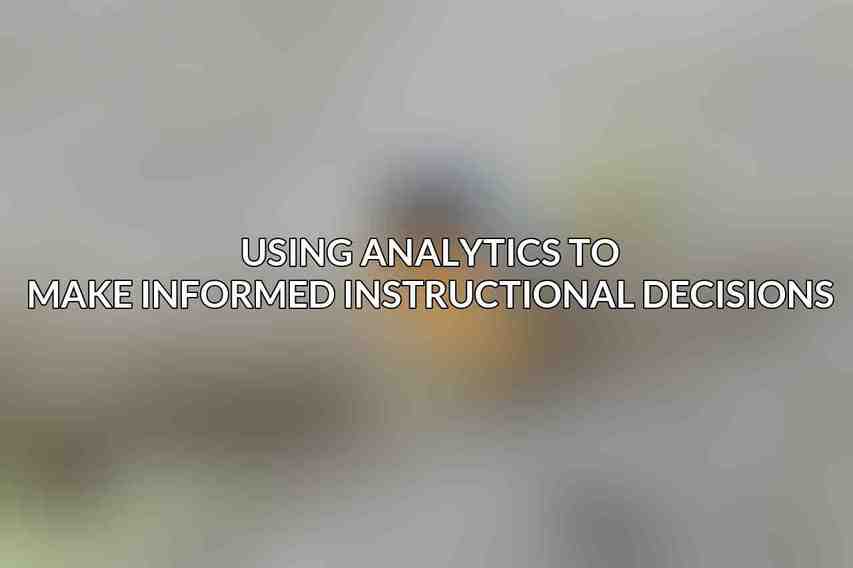Student engagement is a crucial aspect of online learning environments, directly impacting the success and satisfaction of students. Analytics plays a vital role in monitoring and enhancing student engagement by providing valuable insights into student behaviors and interactions within the digital classroom. By leveraging analytics tools, educators can gain a deeper understanding of student engagement levels and tailor their instructional strategies to better support learning outcomes.
Define Student Engagement and its Significance
Student engagement refers to the involvement, participation, and enthusiasm students show towards their learning experiences. In online courses, where face-to-face interactions are limited, engagement becomes even more critical for student success. Engaged students are more likely to complete their tasks, retain information, and perform better academically.
Role of Analytics in Enhancing Student Engagement
analysis, and interpretation of data related to student interactions, performance, and behaviors within the digital learning environment. By utilizing analytics, educators can gain real-time insights into how students are engaging with course materials, identify potential issues, and make data-driven decisions to improve the overall learning experience.
Benefits of Using Analytics to Track Student Engagement
- Identifying and addressing student disengagement early
- Tailoring teaching strategies to meet individual student needs
- Enhancing student retention and success rates
Types of Analytics for Student Engagement
Activity Analytics
Activity analytics focus on tracking student participation and interaction within the learning platform. This type of analytics can include monitoring engagement with discussion forums, completion of assignments, participation in quizzes, and other interactive elements of the online course.
Performance Analytics
Performance analytics revolve around assessing student understanding and progress based on grades, feedback, and assessment data. By analyzing performance analytics, educators can recognize areas where students may be struggling and intervene to provide additional support.
Behavioral Analytics
Behavioral analytics involve monitoring students’ navigation patterns, how they utilize resources within the course, and the time spent on specific tasks. This type of analytics helps in understanding student behaviors and preferences, allowing educators to optimize the online learning environment accordingly. Explore further with Unlocking Student Motivation: Gamification Strategies in Online Education
Interpreting Analytics Data for Engagement Insights

When interpreting analytics data for engagement insights, educators should focus on:- Identifying key engagement metrics– Analyzing trends and patterns– Segmenting students based on their engagement levels
Using Analytics to Make Informed Instructional Decisions

By leveraging analytics insights, educators can:- Adjust course content to increase student interest– Provide personalized feedback to struggling students– Foster collaboration through group activities
Best Practices for Enhancing Engagement with Analytics
When using analytics to boost engagement, educators should:- Establish clear engagement goals– Consistently review engagement data– Implement evidence-based interventions– Engage with students for feedback
Emerging Trends in Analytics for Student Engagement
Artificial Intelligence (AI) and Machine Learning (ML)
The integration of AI and ML in analytics tools allows for personalized learning experiences by adapting content and activities to meet individual student needs. This technology helps in creating more engaging and effective learning pathways.
Gamification and Social Learning
Gamification techniques and social learning platforms are being increasingly used to enhance student motivation and engagement in online courses. By incorporating elements of gaming and social interaction, educators can create a more immersive and collaborative learning environment.
analytics is a powerful tool for educators to enhance student engagement in online courses. By utilizing analytics, educators can gain valuable insights into student behaviors, tailor their instructional strategies, and improve learning outcomes. Continuous data analysis and a proactive approach to leveraging analytics are essential for creating engaging and effective online learning experiences. Educators are encouraged to embrace analytics as a valuable resource for optimizing student engagement and success in the digital classroom.
Frequently Asked Questions
What is the importance of student engagement in online courses?
Student engagement is crucial in online courses as it directly impacts learning outcomes and student success. Engaged students are more likely to actively participate, complete assignments on time, and retain knowledge.
How can analytics help boost student engagement in online courses?
Analytics can help instructors identify patterns in student behavior, such as participation rates, time spent on assignments, and quiz scores. By analyzing this data, instructors can tailor their teaching strategies to better engage students and improve learning outcomes.
What are some common analytics tools used in online education?
Common analytics tools used in online education include Learning Management Systems (LMS) like Moodle or Canvas, as well as specialized software such as Google Analytics for tracking website interactions and student activity. Find out about The Art of Feedback: Effective Techniques to Enhance Student Engagement Online
How can instructors use analytics to identify at-risk students in online courses?
Instructors can use analytics to track student participation rates, assignment completion rates, and quiz scores. By identifying students who are falling behind, instructors can intervene early and provide targeted support to help them succeed.
What are some best practices for using analytics to boost student engagement in online courses?
Some best practices for using analytics to boost student engagement include setting clear learning objectives, tracking student progress regularly, providing timely feedback, and using data to continuously improve course design and content.

